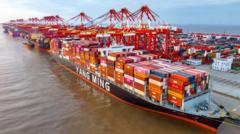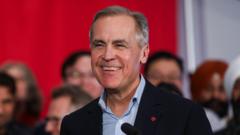With the upcoming return of Donald Trump to the presidency, concerns mount about the potential reintroduction of tariffs and its implications for global trade, inflation, and economic growth in 2025, as analysts warn of adverse effects particularly for allied nations.
The Economic Impact of Trump 2.0: A Global Perspective

The Economic Impact of Trump 2.0: A Global Perspective
As Donald Trump resumes leadership, new tariffs, inflation, and shifting trade dynamics raise questions about the future of the global economy.
As Donald Trump prepares for a potential 'Trump 2.0' administration, the global economic landscape is rife with uncertainty fueled by anticipated policy shifts, particularly in tariffs. The International Monetary Fund forecasts that global growth will stabilize at a modest 3.2% in 2025, but recent changes may complicate this outlook.
In a recent statement, US Federal Reserve Chair Jerome Powell indicated that interest rates might not see the anticipated cuts in the coming year, suggesting a cautious approach amidst ongoing inflation struggles. While American borrowers recently celebrated a third consecutive interest rate cut, stock markets reacted negatively, signaling investor concern over potential economic stagnation.
US inflation rates have recently increased, with figures for November hitting 2.7%, 2.2%, and 2.6% for the US, eurozone, and UK respectively, raising questions about the effectiveness of central bank strategies. The challenges posed by Covid-19 and the ongoing war in Ukraine continue to strain economies worldwide.
JP Morgan's head of global macro research, Luis Oganes, highlighted that Trump's isolationist policies and potential new tariffs could bolster US growth in the short term but would significantly harm countries reliant on trade with the US, particularly Mexico and Canada. Former IMF chief economist Maurice Obstfeld warned of potentially devastating impacts on industries like car manufacturing that depend on integrated supply chains across North America.
Furthermore, as tariffs are reintroduced, the potential repercussions for China's economy loom large, with President Xi Jinping acknowledging the "uncertainties in the external environment." With China's growth forecast recently adjusted from 4.1% to 4.5% by the World Bank, the government is under pressure to bolster domestic consumption while grappling with external tariff threats.
In light of past trade tensions, the electric vehicle sector remains a focal point for future trade disputes, particularly with US and European tariffs already in place. European Central Bank President Christine Lagarde has expressed concern about the broader implications of protectionist measures for trade and inflation.
As 2025 approaches, the economic fate of various nations may hinge on the policies enacted in the US under Trump's leadership. Analysts remain cautiously optimistic about the global economy, but the intricacies of political dynamics and trade relations will significantly influence the trajectory ahead.






















